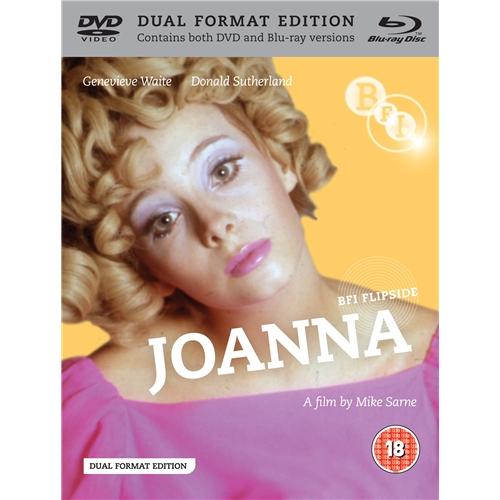Pete's Peek | Welcome to the weird, wild world of Mike Sarne's Joanna

Former 1960s pop singer turned film director Mike Sarne is probably best known for helming the infamous 1970 box office bomb Myra Breckinridge - an overblown, kitsch adaptation of Gore Vidal's novel starring Raquel Welch and Rex Reed.
But two years before his Hollywood debut, Sarne fashioned this quirky story of a wide-eyed girl (Geneviève Waite, who would later marry Mamas & the Papas singer John Phillips) falling in with the loose-living London crowd. Donald Sutherland steals the film as a flamboyant but frail, wealthy young man who invites Joanna on an impulsive trip to Morocco; while Calvin Lockhart (in his film debut) cameos as a street-wise hipster who Joanna falls in love with.
Famously described by Gore Vidal as resembling ‘a collection of cigarette ads’, Joanna is very much a time capsule of London in the 1960s, and has much the same trippy qualities as Myra – especially its narrative structure, which is basically a succession of mad situations that Joanna finds herself in. Think Voltaire's Candide transplanted to a mod London, but minus the debauchery.
Included in the new BFI Flipside release is the brilliant short film on which Joanna is based. Made in 1966, Road to St Tropez follows a married woman travelling in the South of France in a sporty Renault Caravelle (the car of choice for touring the Riviera in the 1960s) picking up strangers along the way, including a very young Udo Kier (in his film debut), before returning to her dull life in the city. This is a wry, cynical look at lonely women of means with too much time on their hands. It's one of those true gems that I can watch over and over, if only for the car and scenery.
The other extra is Death May Be Your Santa Claus (well known in prog rock circles because of its connection to a famous 1971 avant-garde album of the same name by the British psychedelic band Second Hand). The film, about a day in the life of a radical black student, has a non-linear narrative structure that comes across like a Beatnik cut-up poem set to celluloid with loads of allegorical references to racism, poverty, war and religion. It’s very dense, so you’ll definitely need a little something to make this go down. Still, it did prompt me to track down the cult album.
This wonderfully strange, eclectic release is now available as a Dual Format release through BFI Flipside http://youtube.com/v/RPdZHZ_-LYk
The latest updates, reviews and unmissable series to watch and more!

